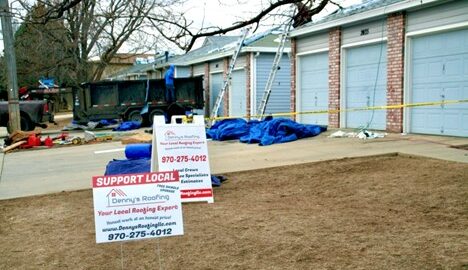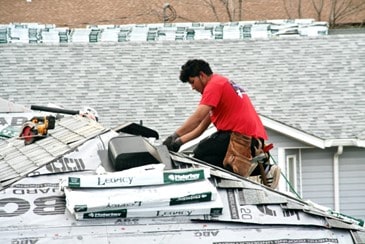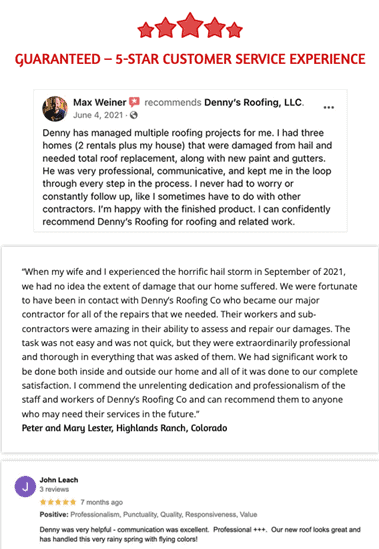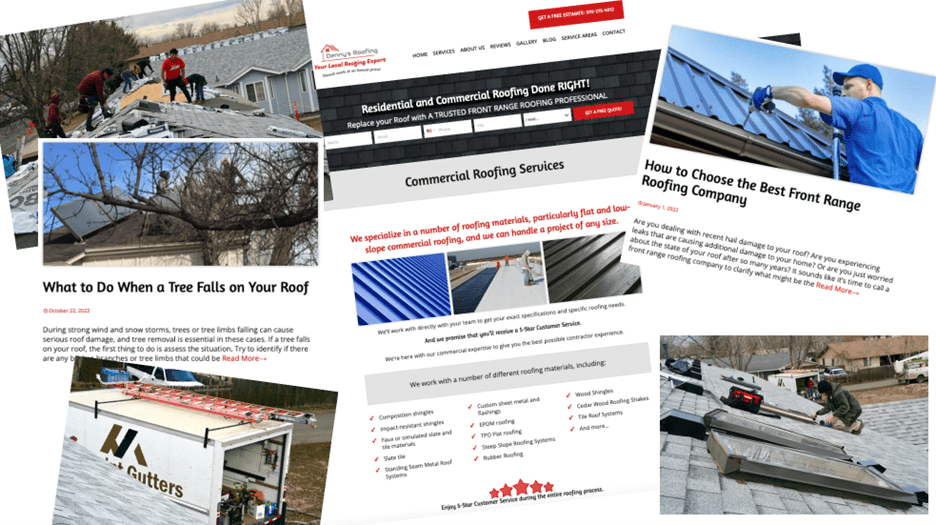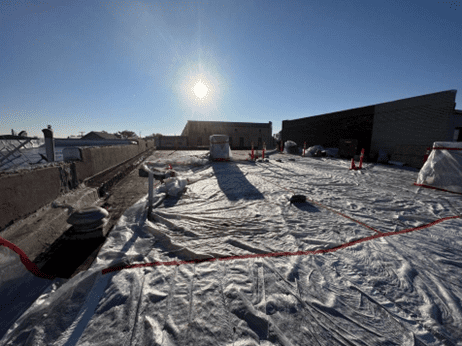A storm sweeps through your neighborhood and there is obvious damage to your HOA community. You and your neighbors have damage to the exterior of your buildings. The storm was strong enough to cause damage to your roof, gutters, skylights, siding, windows, painting, or even more on your HOA complex. You sit on the board of your small HOA or are an advisor that represents your apartment or condo community and everyone is wondering what to do now. Including you.
Where do you start?
“If it is hail or extreme wind damage, call a ROOFING CONTRACTOR because that will be the largest of the trades that will need to get repaired.”
Well, below are some suggestions on what to do to put things back in order.
The first thing that you should do is call a professional contractor to come out and take a look at the entire property and get them to assess the damage BEFORE calling your Insurance company. If it is hail or extreme wind damage, call a ROOFING CONTRACTOR because that will be the largest of the trades that will need to get repaired. Any good Roofing Contractor that does residential and commercial projects will handle all of the additional exterior issues too. If they don’t handle the other trades, and you would have to vet a series of sub-contractors… don’t use that Roofer. They are most likely not a Contractor. Jobbing all that out yourself will be a tremendous amount of effort and if you are sitting on the HOA board, or repair committee and not getting paid, trust us when we say, get someone that will be your Contractor and handle all the details.
If you have a known Contractor that has done work for you in the past, and you have been satisfied with them, you should be in good shape. You have worked with them in the past, you have a track record, and you have a level of trust in them. They took great care of you and did excellent work. You already know who to call. Perfect.
If you have not already vetted a Roofing Contractor, and a storm hits, or you are not sure about the Roofer that you have used or are interested in looking for a NEW Roofing professional — keep reading.
There are several things that you can do to make sure they are going to be a good fit for your HOA.
First, ask for a referral from someone you know in the building industry if you have one. Ask how they know them… and if they have ever worked directly with them before.
If you don’t have a good referral source, you can go online and look for a Roofer that is also a G.C. (General Contractor) and can handle ALL of the different trades that need to be completed for your job. Or at least the vast majority of them. This will save you and the HOA board a lot of busy work down the line.
Next, look for a Roofing Contractor that has an impeccable reputation online with at least 30 to 50 more excellent reviews. They don’t have to be 5-star reviews. As much as you try to make everyone happy, you can’t please everyone all the time. And if they have a few 3 or 4-star reviews, look at their response to the “less than perfect reviews” and see if they offered to make whatever happened – right. Did they work hard to please the client or right the wrong? Especially on the 1-star review. Did they apologize and take responsibility for the situation? Did they explain themselves? Or did they make an excuse and reply to the review in a “snarky” or even worse, an angry tone? In construction, sometimes things happen that are out of the Project Manager’s control, and it can be hard to make everyone happy. But how they respond to adversity and criticism goes a long way. Look for a big “red flag” around how they deal with adversity. Contractors are professional problem solvers and should have lots of patience on all fronts.
Next, look at their website to see if they have a strong presence with a website that has some actual information on it that has value. A site that they feel represents them and their company’s personality. If their words on the page are generic and none specific, they most likely will be too.
You will most likely have a “meh” experience. They will lack the passion to make sure that their jobs are done right. Their website is the front-facing representation of their company. If they are not giving offering up knowledge or pictures of work that they have done, they might not be a good fit. Remember, anyone can say they do a good job and schmooze you enough to get you to sign a contract and get you locked in. Trust your gut on this aspect.
Ask for references that you can call and check in on their previous work. They should be able to give you a list of people willing to sing their praises. There is a big difference between someone doing a satisfactory or adequate job, and a company that creates excited fans. You will be in charge of spending a LOT of money on your project. You want someone that will make you look like a hero at the end of the work.
This is about this for a second – “companies are people wrapped in a logo.” Ask specifically who you will be your “point of contact” and have them earn your business. It’s ok for them to jump through a few hoops to earn your trust. Meet with them a few times. Above all, pick someone that you like working with, who is a good communicator and seems to have decent values and a work ethic. I know that sounds obvious, but you would be surprised. You will be spending a lot of time over the next few months working hand-in-hand with your contractor. They should be responsive and professional and even-keeled and ON TIME. Someone that does what they say they are going to do when they say they are going to do it. They are professional problem solvers.
All contractors must be licensed and insured. A license means that he has the proper licensing to work on your type of property (HOA, Commercial Buildings, Apartment Complexes, Flat Roofing, Multi-Family Residential, etc.) Once you see that they have the GC license for your local, make sure that the contractor is adequately insured. It’s not out of line to ask for up-to-date paperwork. That should not be an issue to get you. It is important that you know exactly what their insurance coverage is. You need to understand if they will cover damages to your property and any other employee liability onsite during the work. You should also ask what is the coverage for the sub-contractors and their employees. When it’s time the contractor will get a building permit to ensure that the work is being done to code with the city or locale where the work is taking place.
Next, once you have picked a few new companies to call, you know what to ask to vet them and you can also learn a lot about them and the company when they come out and take a look at the damage.
Once your Roofer gets there to assess the damage, let them walk the property, either on their own or with you, and then let them explain what THEY see that needs attention on your building, and what they think needs to be done to fix it. You will get a chance to see just how observant they are. And if you are still in the vetting process of choosing them as your Contractor, you WANT them to be extremely observant and thorough and explain things to you. It’s important to have someone that sees more than you do, so that things get done right. They are the expert. You should be able to depend on their expertise without you having to be the one reminding them.
Ask lots of questions to qualify your Contractor:
- Tell me about the repair/replacement process with your company.
- What is your overall production process? What is your system?
- If you use subcontractors, tell me about them.
- Do they have any possible timeline issues to complete the work?
- What types of materials/brands do you suggest that I can look into?
- What should I expect around communications with you? Who/How/Why/details?
- What warranties come with the repair/replacement of the materials and labor?
Don’t be shy.
Once they are done and have given you their field assessment, you can also ask the Contractor to explain what you can expect as the next step once you make your decision on who you are going to work with. Don’t let them push you into signing a contract immediately. A good one never will.
He might say that they are able to repair things or if there is enough hail damage, they might tell you that the roof needs to be replaced and what is involved in calling the Insurance company, to file for a claim and bringing an Adjuster out and a little about the process from that point on.
By this point, if you have vetted several companies, you should have enough information to make an informed decision on who you want to hire.
Once you decide on a Contractor, and let them know, then you can call in a claim and have your chosen Contractor meet with your Insurance Adjuster so that they can help represent your best interest from start to finish. The Insurance process of a claim is pretty standard as to how the process goes. And the only thing that the HOA will be responsible for will be deductible on the policy.
Once you get your estimate from the Insurance company, also called a “scope of work,” the process begins.
If you follow these suggestions on the front end, the actual work itself should happen fairly effortlessly because you will have done a lot of the hard work on the front end of the process. You are now in good hands with a seasoned professional and the foundation of a successful job has been set.
If we can help, or you have any questions about our process, or you need a second opinion, do not hesitate to call our Longmont CO office to speak to one of our experts that can help guide you through this process all up and down the Front Range and close mountain towns.

